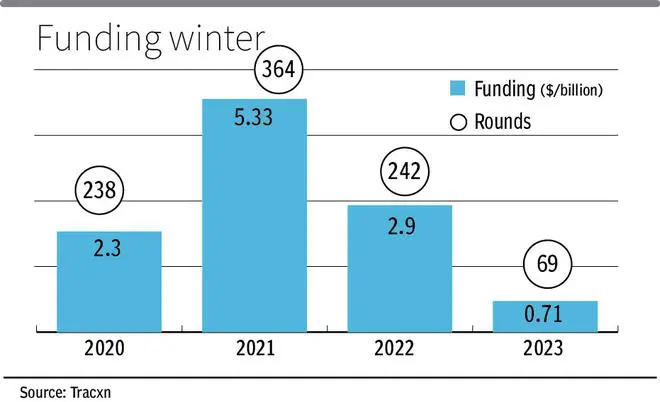In 2023, the edtech sector has been a roller-coaster year due to funding decline as firms realised the need for strategic business improvements and prudent cost-cutting measures to tide over the liquidity crisis.
As the pandemic waned, so did the demand for online learning as schools, colleges and centres reopened for offline classes.
Funding in India’s edtech sector saw a significant drop in 2023 to about $712 million, compared to $2.9 billion in 2022, according to market intelligence platform Tracxn.
In 2023, the number of funding rounds in edtech companies has fallen to 69 from 364 in 2021, and 242 in 2022.
“The recent ‘funding winter’ has been a wake-up call, signaling a return to the foundational principles of business: profitability and sustainable growth. Investors and founders alike are learning that while innovation drives progress, it cannot come at the cost of fiscal prudence,” said Anirudh A Damani, Managing Partner, Artha Venture Partners.

“While larger deals may be approached with caution, there is an expectation of new players emerging in the edtech sector. This hints at a potential revitalisation of the industry, albeit with a more careful and sustainable approach to funding,” said Anil Nagar, Founder & CEO, Adda247.
Byju’s saga and beyond
Byju’s — the most valued edtech firm in the country — is grappling with woes which reflect the overall broader issues that the industry has to deal with.
Bengaluru-based Byju’s faced mounting challenges, including the litigation surrounding the $1.2-billion term loan B, notice from the Enforcement Directorate, troubles with its investors, a liquidity crunch, as well as questions about its core business and acquisitions.
Byju’s woes have triggered scepticism among investors casting a shadow on the overall confidence in the industry.
In the current funding limbo, edtech firms are now pulling out all the stops to scale, attain profitability and attract funding. While some edtech firms are flaunting their newfound love for Generative AI, entering the brick-and-mortar space, put the brakes on expansion and resort to layoffs and other efforts to cut expenses.
Layoffs and minimising cash burn
Many edtech unicorns and smaller startups have continued mass layoffs to reduce employee costs, a major cost centre. Unicorns like Byju’s, upGrad, Unacademy, PhysicsWallah also took up workforce reduction as part of a cost-cutting exercise.
Layoffs were not restricted to unicorns alone; smaller edtech firms such as Simplilearn, Cuemath, Adda247, Skill Lync, and Teachmint too were forced to trim their workforce.
Founders in the sector acknowledged the need to reduce cash burn as investors are not going for funding growth-at-all-costs models.
“One has to look at their unit economics and ensure that they have a viable business model. Companies need to spend within their means and ensure that they are growing at a sustainable rate. High growth companies that are profitable are always going to be in high demand,” said Sumeet Mehta, CEO and co-founder, LEAD.
M&As
The Covid tailwind for the sector busted after the schools and colleges reopened, leading to mergers and acquisitions (M&As) as an escape route for many edtech startups. However, overall, the number of acquisitions this year was lesser than in previous years. According to Tracxn, there were seven acquisitions, a 70 % decline compared with 23 acquisitions in the same period in 2022 and 19 acquisitions in the same period in 2021.
What’s in store for 2024?
Some believe that Generative AI has immense possibilities within edtech and a lot of it lies undiscovered in India in the coming years.
“As we embrace continuous learning and readily accessible knowledge, the ed-tech sector is set to become more engaging, flexible, and driven by proactive AI. The penetration of AI in education will not only enhance productivity but also redefine the learning experience. Microlearning will also take centre stage, providing comprehensive information with minimised effort in less time. Furthermore, upskilling and reskilling will be prioritised, offering flexibility to seamlessly integrate education into the routines of learners,” said Prateek Maheshwari, Co-Founder, Physics Wallah (PW).
While the rise in upskilling and reskilling is also an evolving space.
“Upskilling and lifelong learning segments received its due credit in 2023 and it was the same year when upGrad witnessed a high-growth year, both in terms of learner enrollments and business milestones. This trend will continue in 2024, and the demand for professionals who are market and future ready will soar. This is where skilling companies will play an integral role in shaping up the lifelong learning ecosystem for millions,” said Mayank Kumar, Co-founder and MD, upGrad.





Comments
Comments have to be in English, and in full sentences. They cannot be abusive or personal. Please abide by our community guidelines for posting your comments.
We have migrated to a new commenting platform. If you are already a registered user of TheHindu Businessline and logged in, you may continue to engage with our articles. If you do not have an account please register and login to post comments. Users can access their older comments by logging into their accounts on Vuukle.